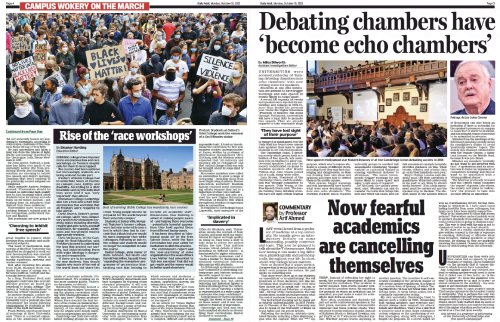Campus wokery (and tea and cake) on the march
Jim is an Associate Editor (SUs) at Wonkhe
Tags
But just for fun I thought I’d take a look here at the Mail’s big splash – proclaiming that “CAMPUS WOKERY IS ON THE MARCH” – to see if there’s any substance to the stories.
The front page story kicks off with nerf gun summary bullets on decol work, unconscious bias workshops and risk assessments for events, and then segues us into traditional comments from John “Common Sense” Hayes and our Hogwarts Skills Minister Andrea Jenkyns:
Universities should be focused on delivering high-quality face-to-face teaching which offers students value for money and sets them up for future success – not wasting time on initiatives that distract from these ambitions.”
Actual concrete example #1 is this thoughtful blog from 2020 from a head of department at Sheffield who considers the historical context of Thermodynamics.
Actual concrete example #2 is this interesting pledge from 2021 at Newcastle to shape a dental school that values everyone equally and ensures equity for all.
RCP stalwart Frank Furedi pops up next to argue that “these kinds of academic activists” are “popping up in the most unlikely places”.
Actual concrete example #3 is this voluntary, optional, general interest lecture at Edinburgh back in March on how someone gave one of their lectures a “decolonised flavour”. Tea and cakes were on offer afterwards.

Almost concrete examples #4 and #5 are that Cambridge and York have established working groups on decolonising geography and chemistry.
Actual concrete example #6 is this interesting module description from Exeter University on “decolonising medicine” that tells undergraduates they will investigate the extent to which science and medicine “have been largely founded on colonialism, oppression, slavery, discrimination and injustice.”
Actual concrete example #7 is a helpful brief on “decolonising the curriculum for first year business studies undergraduates” at Bayes (City University of London’s Business School) which sets business school education in the context of their origins in the 19th century industrial revolutions.
The Office for Students’ Susan Lapworth pops up next. Maybe the bit of her quote where she mentions attainment gaps was left out by the Mail:
Universities decide the content of their courses, and must meet our expectations for rigour and high quality. In doing so, they have a duty to take steps to secure free speech within the law. This matters because robust debate of ideas – including on difficult topics – is fundamental to higher education.”
That’s it for the main story. Accompanying it there’s an op-ed from Cambridge’s Arif Ahmed that scoops up a collection of familiar-sounding anecdotes, a leader comment that reads like it’s been written by a bot, a piece on university debating societies that doesn’t seem to have found a single example of someone being no-platformed or disinvited, and a mini-article on training efforts at 5 Oxbridge colleges.

